Oakville mayor, Mississauga deputy city solicitor, and former Toronto chief planner speak out at Oct. 17, 2017 OMB Review hearing
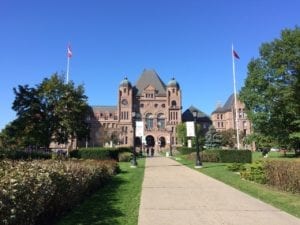
On the afternoon of Oct. 17, 2017, I arrived at Queen’s Park after walking north from Union Station. On the way, I stopped for a fish burrito at the food court at Mount Sinai Hospital. Jaan Pill photo
Update
A recent post is entitled:
Hansard transcript of Oct. 17, 2017 hearing at Queen’s Park regarding OMB Reform is now available
[End]
I was very pleased to have the opportunity to attend a committee hearing at Queen’s Park on Oct. 17, 2017 regarding the Provincial government’s proposed OMB Reform legislation.
I have sent in my own Bill 139 comments, which were due at 5:00 pm on Oct. 18, 2017. You could, however, still send in your comments, even after the deadline:
Click on photos to enlarge them; click again to enlarge them further
A Hansard transcript of the Bill 139 hearing on Oct. 16, 2017 is available.
The transcript for the Oct. 17, 2017 hearing is also available.
What follows are my notes – which are not as accurate as Hansard – from the Oct. 17 event.
My purpose in writing this post is to encourage site visitors to read the Hansard transcripts, which present a wide range of stakeholder views, and which are now available.
Each speaker on Oct. 17, at the hearing I attended, was well prepared.
The order of speakers (there were subsequently some minor changes, in cases where more than one speaker was listed for a given agency or organization) has been listed at a previous post.
Committee members sat around a rectangular table in a room with high ceilings and a good sound system. The noise of the fans directing air flow (it was a hot day) was noticeable but not overwhelming.
I will share highlights in chronological order. I will present the speakers as speaking in the present tense.
In the following notes, for each speaker, I paraphrase some (not all) of the questions, and some (not all) of the answers. I have not yet worked out a capitalization protocol for such hearings, meaning my capitalization of terms is haphazard. (I will work at this, by noting how Hansard handles capitalizations.)
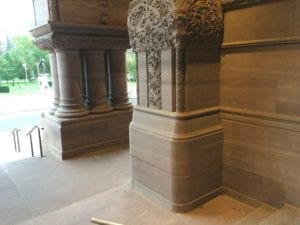
The architectural features of Queen’s Park includes attention to the visual impact of massing. Jaan Pill photo
Standing Committee on Social Policy
The full name of the committee is Standing Committee on Social Policy.
On the agenda was: Bill 139, An Act to enact the Local Planning Appeal Tribunal Act, 2017 and the Local Planning Appeal Support Centre Act, 2017 and to amend the Planning Act, the Conservation Authorities Act and various other Acts.
Each speaker (or group thereof) had ten minutes to present. The following ten minutes were in each case devoted to a Q & A.
The timing of the presentations was perfect, to the minute. The hearing began at 3:00 pm and ended at 6:00 pm.
Transcripts
For a full record, readers are encouraged to read the Hansard account.
Under Bill 139, transcripts of Tribunal hearings will also be available. I encourage readers to read such transcripts. They will provide valuable, primary-source details (as opposed to vague descriptions) of hearings.
Canadian Environmental Law Association
The first speaker, at 3:00 pm, was Theresa McClenaghan, Executive Director and Counsel of the Canadian Environmental Law Association.
McClenaghan suggests withdrawal of the legislation. She speaks of a concern that specified “unwritten rules of practice” would prevail. She notes there is no longer testimony under oath or cross-examination.
She notes that appeals are not analogous to a judicial review. Tribunal, she adds, should be based on the best available information.
Notes no new provisions in place regarding financial barriers currently faced by residents. Resources for residents to fully participate are not there.
Refers to an alternative submission by Environmental Law Association.
McClenaghan supports the Schedule 4 items, and is pleased to see clarification, but “development” and “management” need to be defined.
In summary, recommends continuation of “de novo” hearings. Suggests Items 1, 3, and 5 be withdrawn and that here be a return to public consultation, in place of proceeding with the legislation.
Please note: The Q & As at this post are paraphrases of what people said; please refer to Hansard for the word-by-word, direct quotations
With regard to the Q & A, each of the three political Parties had 3 minutes and 20 seconds to devote to a Q & A with the speaker.
Please refer to Hansard for the full record for each Q & A.
Q: The government’s position is to make sure the Municipalities make the decisions. What’s wrong with that?
A: Question is: What if people have a concern about the decision? If a less robust system replaces the current one, then disputes go to courts. OMB was set up to avoid such a scenario.
Q: In some cases, Conservation Authorities are not up to their mandate of protecting watersheds. In such a case, should the government appoint a Supervisor?
A: If a Statutory Body is not following the Statute, on which basis it was set up, then that situation can be addressed.
Q: Isn’t that which is most effective also the most expensive?
A: We’re talking about proposals with irreversible consequences. Natural resources, once certain decisions are made, will never come back in our lifetime.
Q: How successful has your organization been, at the OMB?
A: Clients have the right to participate. We’ve had success at the OMB. Good decision was made on asphalt plant. Decisions can go either way; there needs to be rigorous testing of evidence.
Q: If the current proposed legislation were to remain, what change would you like to see?
A: Intervenor funding would help. Otherwise, people can’t go to bat with well-resourced developers. It would be good to ensure that people don’t get scared away.
City of Mississauga
At 3:20 pm, Marcia J. Taggart, Deputy City Solicitor, City of Mississauga, spoke.
Taggart is here on behalf of Mayor Bonnie Crombie and Council. Notes City of Mississauga has participated in a broad consultation regarding Bill 139. Refers to provisions giving Municipalities more control.
Says current Bill is an improvement in a number of significant ways. There is a change with regard to the opportunity, previously evident, to second-guess. Current Bill gives more deference to the decision of the Municipality.
Says further exemptions should be considered. Refers to Section 37 and Community Improvement Plans.
Taggart notes reduced length of hearings, changes in how evidence is introduced, and more mediation. Refers to things left to Regulations.
Refers to need to ensure smooth Transition. Matters that are at early stages would best go to the Tribunal.
Notes climate change policies need clarity.
Speaks of excitement, of a long-awaited improvement.
Please note: The Q & As at this post are paraphrases of what people said; please refer to Hansard for the word-by-word, direct quotations
Q & A
Q: Thank you for coming in, on short notice. You like the no-more “de novo.” What’s been your experience?
A: Main concern is: There’s an extensive public consultation process. The process should be given deference. When starting all over, the public consultation process is given little deference.
Q: Do you like the Support Centre concept?
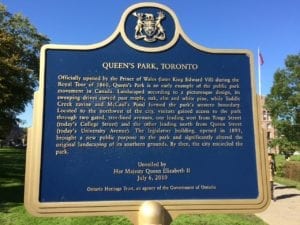
Plaque at Queen’s Park refers to the process whereby, over time, a city came to encircle a park. As noted in the speaking notes for a talk about Col. Samuel Smith and Parkview School in Long Branch, the concept of a city eventually engulfing an open space (such as a farm) is a recurring theme in Toronto’s early history. Jaan Pill photo
A: Absolutely.
Q: Committee member asks question regarding approach to development applications.
A: That’s a broad question. There is circulation and review to all Departments. There is rigorous testing: Is it good Planning; does it meet Policy Requirements?
Q: With Bill 139, how would the land-use process be impacted?
A: We do not know, 100 per cent, what the impact would be. Intake and processing of development applications will remain the same. But OMB is then not in a position to overturn.
The City undertakes rigorous consultation. It will be only improved by the proposed system.
Q: Consider the situation where there is some objection, to what the Municipality proposes. How do you deal with the fact, then, that there is no appeal process, any longer?
A: Any decision that is made must still comply with Provincial plans, with upper-tier plans. Many submissions support Council proposals. People feel frustration when Council decisions are overturned at the OMB.

Entrance at 426 University Ave. to the Royal Canadian Military Institute. It’s one of the places that I passed, on my walk from Queen’s Park to Union Station, where I took the Lakeshore West GO train on my way home to Long Branch, after the Bill 139 hearing. Jaan Pill photo
Q: What changes do you envision, with Bill 139, aside from: Can’t go to OMB? How do you deal with the situation, where there is no alternative route but the courts? Having some authority, to hear what the public has to say, is important.
A: These things are best heard by the Municipal Council.
Q: Question concerns conflict-of-interest situations: How would these be addressed?
A: That scenario would not arrive, as regularly. An outside consultant would not be hired for a “de novo” situation.
Q: What if there is a situation where there is disagreement between a Municipal and Regional level of government?
A: Have not come across that. No submissions have been made regarding that topic.
Q: As a former Hamilton Councillor, I am aware of a concern about public cynicism about politics, about civic engagement. Will the proposed legislation reduce the cynicism?

Cannon display outside of 426 University Ave., Oct. 17, 2017. I began my self-education about the British empire, in my readings about world history some years ago, with the working hypothesis that the empire was essentially benign. Slowly it has dawned on me, however, that for any empire, there is also an “other than benign” aspect. Jaan Pill photo
A: We can only hope so. Advocacy by citizens will be at the Council level.
Toronto and Region Conservation Authority
The next speaker was Brian Denney, Chief Executive Officer, Toronto and Region Conservation Authority, who is retiring at the end of 2017. He spoke at 3:40 p.m.
Denney remarks that enforcement matters. Encourages government to proceed with passage of the Bill. Many Ministries are involved. Broad consultation has occurred. Refers to updating of language, to include some of the current problems related to climate change.
Although “we live in one of the most blessed parts of our Planet,” there are still challenges in the steps leading to the “low-carbon future that we need.” [These may be word-for-word direct quotations, but one would need to check against the Hansard transcript, when it is available.]
Notes Conservation Authorities are challenged to maintain strong community connections. There is a need to address mitigation and adaptation in relation to climate change.
Refers to abuses of natural resources: Abuses can be prevented or addressed through good reinforcement capabilities.
Refers to wisdom of Indigenous peoples.
Refers to Lake Ontario as a a source of drinking waters, flood-control efforts related to the waterfront, and the construction of an innovative, six-storey wood-framed structure. Says government warrants thanks for the proposed changes to the OMB some 70 years after the founding Act that brought the Board into existence.
Please note: The Q & As at this post are paraphrases of what people said; please refer to Hansard for the word-by-word, direct quotations
Q: With regard to resource management today: Is it only publicly owned land that you oversee?
A: Some Regulatory Authority extends to private lands.
Q: What’s the ratio between private lands / public lands, in this regard?
A: Consider the cottage-type residents next to a stream or lake: The Conservation Authority is the overriding Authority, even in such a case involving private property.
Adds, in further discussion: It depends on what is in place, for a given Conservation Authority. There are cases where private lands are subject to the Authority of Conservation Authorities.
Q: Do you favour the proposed legislation?

The body language of an observer at the Oct. 17, 2017 hearing – in particular, the sense of repose – caught my eye giving rise to a sketch. Jaan Pill drawing
A: Yes.
Q: Is there enough access, with regard to permits, and consequences?
A: In rare cases in the past, when some activity on private lands has been hidden from view, Conservation Authorities have advocated for improved access.
Q: I assume TRCA is involved with many things – including timber-building construction?
A: One of TRCA’s first areas of focus was the energy performance of buildings, over the past 25 years of dealing with climate change. Refers to timber-construction building at new TRCA headquarters.
Q: What role does TRCA play with regard to commenting on proposed development projects?
A: TRCA comments with regard to issues related to natural hazard and natural heritage.
Q: Question is asked regarding cases of Conservation Authorities who are acting with regard to wetlands, in a manner that suggests they are working in alignment with developer interests.
A: Says he is not on top of that.
Q: Question is asked regarding the expertise of appointed Conservation Authority board members. A question regarding expertise in certain areas. Will this matter have an impact on the tax rate? Can there be a conflict with regard to a funding authority?
[As with other Q & As, I recommend that readers refer to the Hansard transcript for an accurate and full account of the wording of the question above, and of the answer that follows below. The notes you are now reading capture only highlights.]
A: The Municipality should appoint the members of the board. The expertise should come from the staff.
Q: Are board members elected?
A: Nine of 14 from Toronto are elected; five are appointed by an interview process.
Q: Question refers to areas not covered by Conservation Authorities.
A: [I did not write down a note regarding the answer.]
Building TO Inc.
At 4:00 p.m. Stephen Diamond of Building TO Inc. spoke first; the second speaker was Jack Winberg.
Steve Diamond notes that for the last ten years he has been involved with real estate development.
Notes he and colleagues are in the business of providing housing. “We are,” he says, “the voice of the people that don’t have a home.”
He adds that he has used OMB for only two days.
Diamond notes that the question is: How will the proposed legislation operate in reality? Wants to ensure a proper forum is in place, where issues can be properly addressed.
Says Toronto is considered one of best-planned cities in the world, and that OMB has acted as a watchdog to test policy decisions. “You’ve removed the watchdog,” Stephen Diamond adds.
“I have to deal with these issues on a daily basis.”
Notes Toronto has 47 Councillors [reference appears to be to the number that would be in place if the current numbers are increased from 44 to 47, as discussed a year ago, as noted at a Nov. 9, 2016 Toronto Star article].
Notes all Councillors work at the Committee level, where persons making deputations have only five minutes to speak. Adds that the opinion of the Ward Councillor prevails, and that courts have ruled that a fair hearing at the local level is not required, because the option of the OMB appeal process exists.
Says local representatives are well-meaning but not equipped for a well-reasoned decision-making process.
Adds that the Regulations have not yet been seen and that Municipalities need time to adapt to these changes. Otherwise, there will be chaos in the provision of houses. How will procedural fairness be ensured?
Jack Winberg, also speaking on behalf of Building TO Inc., notes that significant changes are being made. Refers to contentious development applications. “The fact is,” he says that a fair hearing is provided by the Board” [that is, the Ontario Municipal Board].
Refers to a need for a “fair and proper process.”
Notes the developer [at City of Toronto Committee meetings, referred to above] has only five minutes to speak, and “has no chance to respond to wild statements” [that may be a paraphrase; the definitive wording will be in Hansard].
Notes Councillor must spend more time on hearings. Recommends that hearings be held on what is appropriate for a given Municipality, before the Rules and Regulations, related to Bill 139, come into effect.
Q & A
Q: A question is asked about past interactions with OMB.
A: It is noted that developer has only been to OMB once, in a situation were Ratepayers “were not happy.” Notes the City had no objection to the application in question. Refers to a Post Office repurposing project.
Q: Question regarding whether it is possible to work things out within the current structure.
A: We can accomplish our objectives because everybody knows there’s a place that offers an “unbiased” and “open and transparent forum” [the quotes refer to the answer, by Stephen Diamond, to the question] where “issues can be addressed.”
Q: If a Ratepayer speaks, “someone will have oversight,” in the system currently in place. With the new system, the oversight is not there. The ability to compromise is taken away.
A: The legislation “must broaden the rights of appeal.” Adds that [if my notes are correct; this must be cross-checked again Hansard] height and mass are not grounds for appeal.
Q: How many houses have you built?
A: Thousands.
Q: How many are affordable?
A: A proportion. Maybe 10 or 15 per cent.
Q: Can you not make written submissions?
A: At Toronto City Hall, it’s not the same. Refers to OMB as a “transparent and open forum” where everyone is on their toes.
Q: As opposed to following of the Official Plan: Doesn’t that [following of the Plan] make sense?
A: [Stephen Diamond:] No. There’s no longer appeals on the Official Plan. Say the Municipality says there will be no Non-Profits involved in a development. The Planning Department [not clear which Planning Department is referred to; Hansard will include this detail] knows there’s a place to go to, if there is a lack of fairness.
Q: Is it possible that, with the changes, developers would work more collaboratively with Municipalities?
A: There are good things in the Bill. Mediation is a great idea.
Our concern is with details of the implementation.
Also: OMB encourages people to be reasonable. That’s what makes the thing so successful.
Q: Is OMB being used to build very high-density buildings?
A: That potentially has happened. Refers to a case that went to OMB and then mediation. Another case involved a Provincially-funded Non-Profit.
Please note: The Q & As at this post are paraphrases of what people said; please refer to Hansard for the word-by-word, direct quotations
Association of Municipalities of Ontario
At 4:20 p.m., Lynn Dollin, President of the Association of Municipalities of Ontario, spoke.
Refers to a topics related to case management. [At this point, in the hearing, I took a short break from note-taking. Interested readers will be able to access the details of the Association of Municipalities of Ontario presentation, and the first part of the Q & A, at the Oct. 17, 2017 Hansard transcript.]
Q: A question was asked regarding the Transition.
A: When the Implementation Day arrives, for any [such major undertaking], there is always extra work. We see no reason to delay.
Conservation Ontario
At 4:40 p.m., Kim Gavine, General Manager, Conservation Ontario, spoke. Hassaan Basit and Bonnie Fox were also on the speaker’s list, for the organization; I don’t recall if they spoke.
Kim Gavine notes she is representing Conservation Authorities.
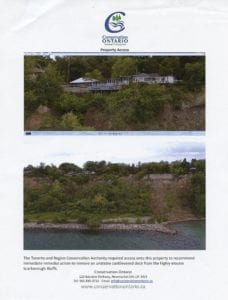
The Conservation Ontario handouts on Oct. 17, 2017 included two photos featuring property access, that the TRCA required, in order “to recommend immediate remedial action to remove an unstable cantilevered deck from the highly erosive Scarborough Bluffs.” As with other images, you can click on the image to enlarge it; click again to enlarge ir further.
Refers to a case of damage to wetlands. Costly injunctions followed. Smaller Authorities can’t afford the cost of injunctions.
Notes liability risks from climate change are growing. Indemnity (as in Saskatchewan) is required. Is over all very supportive of the Conservation Authority initiative [in the proposed legislation].
Q: Thank you for the outline you have provided. Can you police rogue members?
A: We don’t have that ability. We have no oversight of their operations.
Q: There have been complaints with regard to some Conservation Authorities. Some people have asked the Province to play a more central role. Any suggestions? What powers [could be be placed in the Bill,] or [are in the Bill], so that an outside Authority could take action? [The square brackets refer to the fact that I am not clear, from my notes, just what the question was.]
A: We are open to improvements. Refers to public sector accountability. If the Bill is passed, the Province could step in.
Q: Are there any circumstances that would justify the Province taking over an Authority?
A: If I were a Conservation Authority I could answer. Our Council meetings address such questions. It’s not been discussed at Council.
Q: Did you ask the government to help with things [that were of concern]?
A: Refers to looking for more modernized decisions. We didn’t address powers of entry. TRCA did. There is support, in Bill 139, for powers of entry. To protect life and property. In extreme circumstances.
Q: Question refers to the ability of the Province to [give direction] related to additional authority. [Question also refers to qualifications. My notes unclear at this point.]
A: We have not taken a position.
What is in place works well. Boards serve their purpose. There may be times, when any good model doesn’t work. The model works in most cases.
Q: The reputation of Conservation Authorities is at stake. Refers to the topic of abuse of power. Of not carrying out mandate. Lawyers and medical bodies are in a position to discipline their members. Other bodies can be disciplined.
Reference is made to question of protection, by residents, of wetlands. Question of situation where a Conservation Authority has [had a negative impact].
A: There are tools to protect against that.
The Conservation Ontario handouts on Oct. 17, 2017 included a page with two photos concerned with property access, that the Toronto and Region Conservation Authority required, in order “to recommend immediate remedial action to remove an unstable cantilevered deck from the highly erosive Scarborough Bluffs.”
Jennifer Keesmaat
At 5:00 p.m., Jennifer Keesmaat, former Chief Planner, City of Toronto, spoke.
Speaks of a lot of ground having been covered. Says new legislation will function within a pro-growth context. The challenge is the infrastructure to keep up with growth – such as parks and schools, that is, the things a complete community needs.
Planning is good – it directs growth to existing growth areas.
We need density. We need density to support transit, to reduce the environmental footprint. We need [that which is] proactive.
We do not need an approach, of a building at a time. We need a planning framework. “It’s difficult to say how transformative that [aspect of the new legislation] is.”
Currently, one individual fights [the citizen’s] interests. [Nor clear if I have this correct, from my notes. Please refer to the Hansard transcript, when it is posted.]
Describes OMB as a problem way [of making decisions], based on a very narrow framework.
Refers to Places to Grow; refers to density targets.
If we had a policy-drive process, then …
In this case, it is NOT a quasi-judicial process.
Unelected officials are making decisions. “How much does respect for democracy matter?”
The changes proposed in this Bill represents a fundamental shift. Planning Departments will re-shift efforts toward proactive planning.
We are a pro-growth Region. Vast majority [of planning proposals] do not go to the OMB. They are aligned with Provincial Policy and are accepted by local communities.
Certain developers work in collaboration with stakeholders. Refers to Westbank Corp. development for Bloor and Danforth – for former Honest Ed’s site. Refers to over 20 heritage buildings that have been included in the development.
This does not get done when it gets punted to the OMB.
Bill 139 is reinforcing how we use policy to get democracy to work.
Refers to situation wherein officials don’t take responsibility for decisions because it will be shunted to the OMB.
Refers to Eglinton Crosstown. Development industry said: Put as-of-right zoning in place. “We did. You can put up an eight-storey building.”
Development industry said: We want to see new development along transit corridors. Developers came back for more [after original proposals accepted]: The OMB has enabled this [that is, has enabled the coming back for additional density].
Notes that the question is: Should policy based on sound planning guide what we do?
Refers to mitigation of shadow impact.
Adds that the OMB does not respect local Council. Not the way to go.
Q: Refers to what is consistent with the developer side, and with the Municipal side: That is, it’s broken. If we work together, make the right decisions: How do you envision [the previous tensions, that are inherent in the process] would remain?
A: Two answers.
1) Proposed change to OMB brings us in alignment with a typical Plan Process.
2) Negotiation should not be site by site, but by the Area Plan level.
Q: Refers to major development: We need to know up front. Most appeals involve developer wanting more density. How to deal with that?
A: In Toronto we have 19 Corridors pre-zoned for mid-rise development.
Q: You’re enthusiastic about the Bill?
A: The Bill will change how Municipalities plan. More Area Plans, more Neighbourhood Plans.
Q: Refers to a situation where Policy drives decision making, and where local elected officials take more responsibility.
A: Absolutely. It’s also the better part of democracy. Accountability must be taken. The way Bill 139 it’s structured, [there’s a requirement] to look at policy. That compares to a dangerous way – that is, decisions made behind closed doors at the OMB, with no accountability. Notes that OMB Adjudicator may be a person who lives in Kingston, who makes a Planning decision affecting a Toronto Neighbourhood.
Q: What is the greatest impact, of Bill 139?
A: An opportunity for re-engagement by communities in the Planning process.
Q: Some sectors, we won’t see any more development. We won’t see density [that is required] to support transit and other things.
A: Refers to the Provincial Policy Framework. The Policy promotes growth. Otherwise, a proposal is overthrown at the OMB.
Refers to a situation: A developer says, “I bid eight storeys; I want to build what Policy allows.” Speculator, however, outbids the latter developer.
Says believes Bill 139 will reward the latter kind of developer, who wants to build the mid-rise buildings that the Policy allows.
Ontario Society of Professional Engineers
At 5:20 p.m., Patrick Sackville, Lead, Policy and Government Relations, Ontario Society of Professional Engineers.
Robert J. Muir, Manager of Stormwater, Environmental Services, City of Markham, also spoke.
Sackville speaks of an engineering-profession view regarding Bill 139. We recognize the need for help, with regard to land use, he notes. But we have problems, he adds. Says Bill may compound or exacerbate several problems.
Muir speaks of a fourth attempt, since 2003, to address the land-use planning regime. This is the most far-reaching attempt. Shares analysis “through the lens of the engineering profession.”
Refers to “true cost of resiliency.”
Speaks of need to maintain a balance regarding “conservation versus restoration.”
Says sometimes it is advisable to interfere with natural features. Refers to inefficient land use.
Says Bill 139 does not create clarity regarding Conservation Authority interference in land-use cases. Refers to things that have to do with water. Expresses concern Conservation Authorities would have important [monopoly] over land-use decisions.
Refers to reduction in Permitting requirements – contrasts latter to a Federal Fish Act.
Says greater resiliency means greater costs.
Refers to climate change. Says Green Infrastructure implementation costs could amount to hundreds of billions of dollars. Notes Conservation Authorities are not responsible for these Capital Costs. Says Homeowners and Taxpayers must pay the costs. That in turn, he adds, does not help transit and housing including affordable housing.
Q: You refer to unintended consequences.
A: An example is with regard to climate resiliency, which gives rise to promotion of Green Infrastructure. Consider the impact on existing structures, and the interference with existing water supplies.
Says we have to have balance to recognize potential impacts of resiliency – including long-term [infrastructure] maintenance, and Financial Planning aspects.
Q: Refers to a concern regarding an increase in Conservation Authority powers.
A: It’s a matter of how powers are applied. Consider, for example, a low-water headwater swale. Urges caution regarding over-regulaton: Think of the potential impacts. Refers to inefficient built form and transportation.
Q: Consider the Ministry of Natural Resources and Forestry and the Conservation Authorities: Do you see differences?
A: Municipal and riverine flood management integration is required. Lake flooding is related to an operational concern. Conservation Authorities can help with regard to proactive management of water levels. Or what you could be dealing with, at times, is a natural fluctuation.
Q: What benefits are there, with regard to climate change responses?
A: It’s in the old places – that’s where flooding occurs. Only half of the flooding is in the river areas. You have to focus outside the Conservation Authority areas and outside the new developments. It’s more a matter of the legacy flooding areas, which are in the old developments.
Town of Oakville
At 5:40 p.m., we heard Rob Burton, Mayor, City of Oakville.
Speaks of Oakville’s strong support for Bill 139. Says it’s critical for it to be enacted.
“We want decisions to rest with local Councils.”
Specifies what is growth. “We want planned growth, led by public-input policies.”
Notes that over 1,000 people contributed to the Liveable Oakville Plan. Refers to Official Plan and Zoning By-Law.
Refers to millions of dollars, over eight years. Evidence-Based, meets Provincial Requirements, and meets interests of the community.
The result? Fifty-six OMB appeals.
Notes two appeals were little more than “simple extortion.”
Notes that “bargaining” is not Planning.
Appeal process is not yet finished. Refers to spending of tax money to defend Zoning that conforms to Provincial Policies.
Adds: “Splitting the difference” is not good Planning.
Notes “de novo” cases are confusing for the public.
Speaks in favour of: Stability. Predictability, and the Rule of Law.
“The world works best when it’s not arbitrary.”
Refers to City of Oakville’s team of Certified Planner staff.
OMB has forgotten to recognize, he notes, the authority of Planners on Council.
Defines NIMBYism as “people expressing their own interests.”
Bill 139 solves the problem that Council “will be too political.”
Speaks of new legislation as a wake-up call, for politicians who are not following Provincial Policies.
Speaks of need to address the challenges. Notes developers have filed preemptive, or anticipatory, appeals. So, before the OMB Reforms come into effect, they seek to preserve the speculation that is in place.
Adds: May 30, 2017: Let it only go to that date. “No Planning applications should be allowed to bypass” the new process. If it’s, “Now you see it, now you don’t,” [with regard to the role of the OMB], you will see a loss of public confidence.
“This [OMB Reform legislation] will enable us to preserved the character of our communities.”
During the presentation, the Oakville mayor also did a role play – presented a dialogue – from a work of fiction that features a character who plays the role of a pirate. [The role-play was well-received.]
Q: Speaks of “deep respect for your wise counsel.” Refers to public cynicism. Notes a lot of Councils will have more work to do, with the new legislation. Hopefully there will be less cynicism, with regard to the matter of people being heard.
Concurs that this needs to be retroactive: “The whole Bill was about fixing the system.”
A: Credible, Predictable, Stable [don’t know if I got the wording correct, in my notes]: That’s what the citizens of Oakville want.
“You don’t want a game of Beat the Clock.” Refers to Planning as a serious matter. Refers to the “Speculation society” that Jennifer Keesmaat referred to. Says Keesmaat nailed it: “That is the problem.”
Refers to a situation: A building is approved, not built. Spoke of new legislation as providing a clear way forward: “You know what’s going to happen.”
“Citizens want to know they have a social contract with their government.”
Q: Refers to OMB’s problems. Refers to a challenge: The situation in which Citizen Groups say that that there is something in a proposal, that indicates that Council is deciding against the Citizens’ interests. Where can we go? Not suggesting, however, that the present OMB system is sustainable.
A: They will have a say. They will have the right to participate, and the right to change the Council. In Oakville, I ran a leadership group 17 years ago – group was not happy with how decisions were made; felt OMB was not the answer.
“This is a better system.”
These groups do not have a good track record at the OMB. The OMB disregards citizens, disregards Certified Planners.
Refers to imbalance in resources [related to representation of citizen compared to developer at the OMB].
Q: Question regarding London, Ontario – any new appeals, by the new rules? [Not clear, from my notes, what the question refers to.]
A: I don’t know a Mayor who disagrees that we have a crisis – it’s because we permit so much speculation in our system.
Please note: The Q & As at this post are paraphrases of what people said; please refer to Hansard for the word-by-word quotations

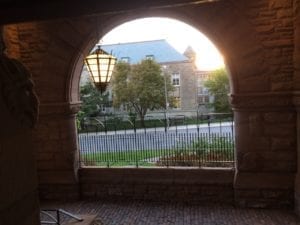
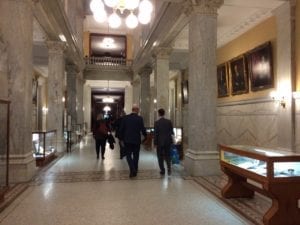

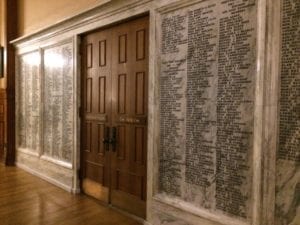
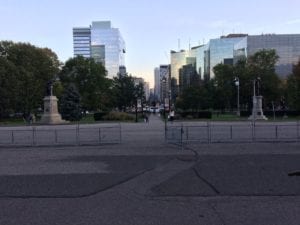
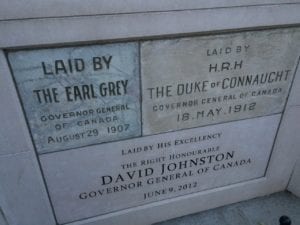
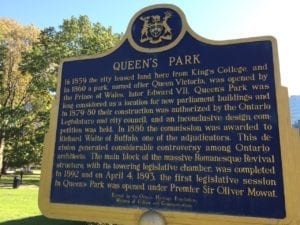
Leave a Reply
Want to join the discussion?Feel free to contribute!